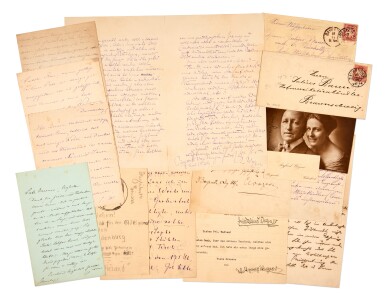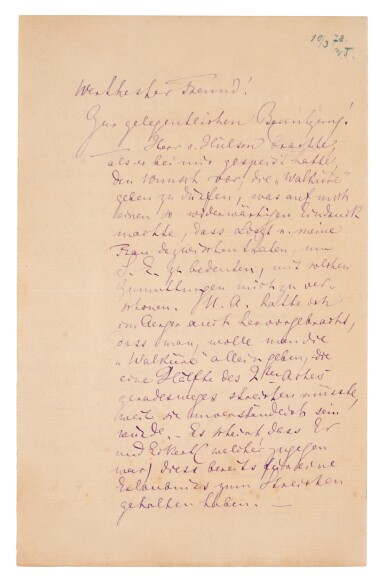Richard Wagner
Autograph letter signed (“Richard Wagner”), in French, to Count Colonna-Walewski, ABOUT TANNHÄUSER
beginning by expressing from the depths of his heart the gratitude he feels for the Emperor’s command to have the opera staged at the Opéra, thanking also the management and performers for their support, explaining that he has become convinced that the orchestral director lacks the necessary experience for the difficult task of conducting his opera, citing the conductor’s lack of memory and inability to maintain the indicated tempos, stating that the singers feel unsupported and that he fears a mediocre performance of a work which, as he admits, makes no concession to the ordinary taste, informing him that he has stepped back from assisting at rehearsals, and noting that the conductor has refused to allow him to take over control of the orchestra; in the final part of the letter the composer notes the grave difficulties a solution of the current situation presents to him, adding that ordinarily he would withdraw his work, but being aware of the distinguished favour bestowed on him he would not dare request the authorization to do so without having exhausted all means of reconciliation
…Depuis que je lui ai retiré mon assistance immediate et que j’ai quitté la scène pour me placer dans la salle j’ai pu constater à chaque instant l’incapacité, le manque de mémoire, l’impuissance à maintenir le movement indiqué; mes chanteurs sont abandonnés, ils ne se sentent plus soutenus.Dans ses conditions l’effet de la representation sera mediocre, et bien loin de répondre aux moyens employés, s’est là un danger immense pour un ouvrage qui ne fait aucune concession au gout ordinaire…
4 pages, 4to (26.3 x 21cm), Paris, 7 March 1861, horizontal and vertical folds, tiny tear to outer margin of first leaf, very slight splitting to horizontal fold of second leaf, some light creasing A fine letter written at the height of the stormy preparations of the staging in Paris of Wagner’s Tannhäuser.
It was the rule of the Paris Opéra that the official conductor of that institution - then Pierre-Louis Dietsch (1808-1865) – should conduct every new work performed there. Dietsch’s shortcomings however as a conductor, ever more manifest in the final rehearsals of the much-rehearsed opera, convinced Wagner that he must be allowed to take the final rehearsal and conduct the first three performances. Following Dietsch’s refusal to accede to such a demand, the composer appealed over his head – in the present letter - to the French Minister of State Alexandre Florian Joseph, Count Colonna-Walewski (1810-1868). When the minister refused to intervene, Wagner decided to withdraw his score, a move which Walewski also refused to countenance. When a final appeal to the Emperor along the same lines also met with a refusal, Wagner decided to let matters run their unfortunate course, so setting the stage for one of the most notorious opera débâcles in the history of music. LITERATURE:Richard Wagner Sämtliche Briefe, vol.13 (2003), pp.72-73 (no.48); Ernest Newman, The Life of Richard Wagner ii (R/1976), pp.99ff.
Richard Wagner
Autograph letter signed (“Richard Wagner”), in French, to Count Colonna-Walewski, ABOUT TANNHÄUSER
beginning by expressing from the depths of his heart the gratitude he feels for the Emperor’s command to have the opera staged at the Opéra, thanking also the management and performers for their support, explaining that he has become convinced that the orchestral director lacks the necessary experience for the difficult task of conducting his opera, citing the conductor’s lack of memory and inability to maintain the indicated tempos, stating that the singers feel unsupported and that he fears a mediocre performance of a work which, as he admits, makes no concession to the ordinary taste, informing him that he has stepped back from assisting at rehearsals, and noting that the conductor has refused to allow him to take over control of the orchestra; in the final part of the letter the composer notes the grave difficulties a solution of the current situation presents to him, adding that ordinarily he would withdraw his work, but being aware of the distinguished favour bestowed on him he would not dare request the authorization to do so without having exhausted all means of reconciliation
…Depuis que je lui ai retiré mon assistance immediate et que j’ai quitté la scène pour me placer dans la salle j’ai pu constater à chaque instant l’incapacité, le manque de mémoire, l’impuissance à maintenir le movement indiqué; mes chanteurs sont abandonnés, ils ne se sentent plus soutenus.Dans ses conditions l’effet de la representation sera mediocre, et bien loin de répondre aux moyens employés, s’est là un danger immense pour un ouvrage qui ne fait aucune concession au gout ordinaire…
4 pages, 4to (26.3 x 21cm), Paris, 7 March 1861, horizontal and vertical folds, tiny tear to outer margin of first leaf, very slight splitting to horizontal fold of second leaf, some light creasing A fine letter written at the height of the stormy preparations of the staging in Paris of Wagner’s Tannhäuser.
It was the rule of the Paris Opéra that the official conductor of that institution - then Pierre-Louis Dietsch (1808-1865) – should conduct every new work performed there. Dietsch’s shortcomings however as a conductor, ever more manifest in the final rehearsals of the much-rehearsed opera, convinced Wagner that he must be allowed to take the final rehearsal and conduct the first three performances. Following Dietsch’s refusal to accede to such a demand, the composer appealed over his head – in the present letter - to the French Minister of State Alexandre Florian Joseph, Count Colonna-Walewski (1810-1868). When the minister refused to intervene, Wagner decided to withdraw his score, a move which Walewski also refused to countenance. When a final appeal to the Emperor along the same lines also met with a refusal, Wagner decided to let matters run their unfortunate course, so setting the stage for one of the most notorious opera débâcles in the history of music. LITERATURE:Richard Wagner Sämtliche Briefe, vol.13 (2003), pp.72-73 (no.48); Ernest Newman, The Life of Richard Wagner ii (R/1976), pp.99ff.













Testen Sie LotSearch und seine Premium-Features 7 Tage - ohne Kosten!
Lassen Sie sich automatisch über neue Objekte in kommenden Auktionen benachrichtigen.
Suchauftrag anlegen